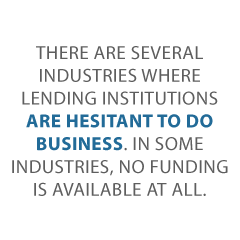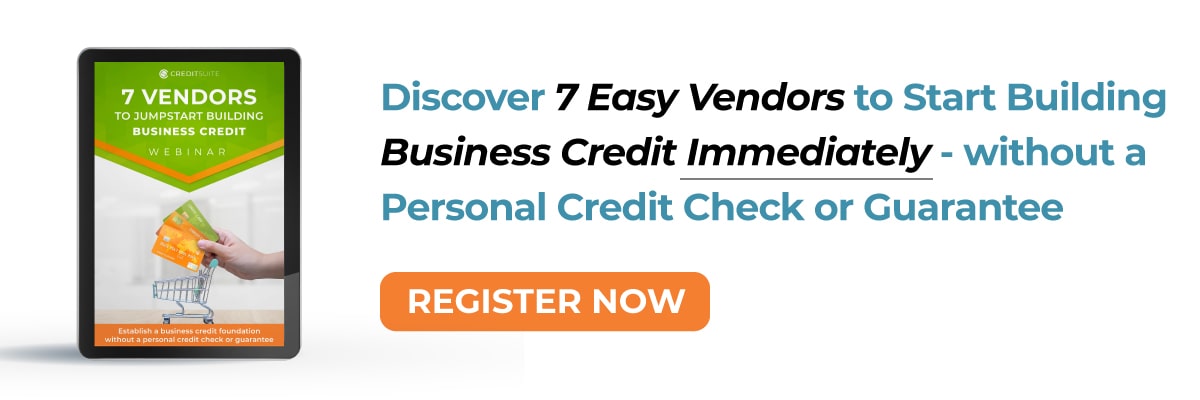Choosing Lower-Risk Business Names
There’s more beyond coming up with the perfect memorable name which is easy to spell and say and evokes your company’s mission statement. There’s also the matter of risk. Adding a risky business type into your business name will trigger financing denials.
For example, bail bonds are a restricted industry. So are many types of financing business types and check cashing agencies. Hence naming your venture Chico’s Bail Bonds is a recipe for a delay if not an outright denial.
But there is nothing deceptive, illegal, or unethical in naming your company Chico’s.
Will this more generalized name guarantee funding for your business venture? Of course it won’t. But at least your business will not be automatically turned down before you can make your case for funding. No one compels entrepreneurs to use high risk business names.
Risk is Your Business – Maybe
Is your business a risky one? How can you tell? Risky business codes and names will tell the tale.
Not all businesses are the same. There are qualitative differences, to be sure, between day care centers and car washes, long haul trucking companies and laundromats. These dissimilarities do not just come from the variety of industries.
Rather, the difference has to do with risk.
Risk is Baked Right In
When considering any aspects of a business, risk has to be a major factor. There are inherent issues in every single industry. Crops fail, lease terms go up too high so a company has to move. Or tariffs or even a war or pandemic make importing less reliable.
But some businesses are considered to be risky by their very nature. And this is the case even if everything else goes off like a hitch and the business is prospering. Risk is inherent within these business types. Therefore, even if your business doesn’t feel risky, it might be anyway.
Why Risk Matters
 The biggest reason why risk matters has to do with funding. There are several industries where lending institutions are hesitant to do business. In those particular cases, there are stricter underwriting guidelines. But at least a company can get funding.
The biggest reason why risk matters has to do with funding. There are several industries where lending institutions are hesitant to do business. In those particular cases, there are stricter underwriting guidelines. But at least a company can get funding.
Not so with other industries. In some industries, no funding is available at all. As a result, those businesses will need to find other solutions for financing. These solutions can include, potentially, crowdfunding, angel investors, venture capital, business credit building and more.
But a lot of businesses would rather work with lenders. And then it all comes down to two separate types of codes which lending institutions use to judge your business.
SIC Codes
The SIC Code (Standard Industrial Classification) is a part of a business classification system.
A Standard Industry Classification code, or SIC is a four digit numerical code which is assigned by the U.S. government to businesses. So the idea to make it easier to identify the primary activity of the business. It is an indicator of the kind of business a company is in.
The Securities and Exchange Commission developed this system. For example, if your company makes tires and/or inner tubes, then your SIC code would be 3011. The numbers are somewhat intelligent. This is because there are ranges of industry groups which correspond to the first of the four digits. Such as manufacturing corresponds to four-digit SIC codes which start with either a 2 or a 3.
The combination of the first and second digits then defines the major industry group. In our example, 30 will designate ‘Rubber and Miscellaneous Plastic Products’.
The SIC code’s digits are grouped to identify the industry and industry group. The first two digits in SIC industry codes identify the major industry group. The third digit identifies the industry group and the fourth digit identifies the industry.
The IRS
In fact, the Internal Revenue Service will use the SIC code that you select. This is in order to determine if your business tax returns are comparable to the other businesses in your industry. Therefore, if your tax deductions do not reasonably resemble the other businesses in your industry, your business could be audited.
Furthermore, some companies may be labeled high-risk when they do not select the right SIC codes to classify their company. However, if you understand how the business classification system works, great! Then you can choose the correct code on your first try.
NAICS Codes
The North American Industry Classification System (NAICS) is another business classification code.
An NAICS code classifies business establishments for the purpose of collecting, analyzing, and publishing statistical data related to the U.S. economy. NAICS industry codes define establishments based on the activities in which they are primarily engaged.
The NAICS puts out its own list of high-risk and high-cash industries. Higher risk industries on the list include casinos, pawn shops, and liquor stores, but also automotive dealers and restaurants.
OSHA requires injury and illness reports from certain high-risk industries.
Which Code is Used?
They both are. However, the SIC code system is phasing out and NAICS will replace it. But for the moment, assume they are both in play, as the transition has not yet finished. These coding systems are similar but not identical.
Lenders, banks, insurance companies and business credit reporting agencies use the two business classification systems to determine if your business is a high-risk industry classification. This means that you could get a denial for a loan or a business credit card. And it would be based on your business classification. Some SIC codes can trigger automatic turn-downs, higher premiums, and reducing credit limits for your business.
True Injury Risks According to the CDC
In 1999, the Centers for Disease Control published an article on risks in small businesses. This article contains information on SIC codes and gives information on injuries associated with the codes. While this is not the true means by which lending institutions decide on risk, it is still of interest and can demonstrate what may be behind some of the reasoning.
Part of the calculus of risk comes from occupational injuries such as those noted in the CDC report. But the other side of the risk coin is occupations which are high in cash transactions. After all, a pawn shop might not have much of a specific risk of injury at all. But the large amounts of cash normally associated with one mean that it’s a tempting target for thieves. Hence they are seen as high risk industries.
Choosing Better SIC Codes
The choice of SIC code is yours. For automotive sales, for example, you would normally select 5511, ‘Motor Vehicle Dealers (New and Used)’. However, most lenders will automatically turn your business down. This is because of the high-risk factor within the business classification name. Naturally, you want to be honest with your SIC coding classification. But if more than one SIC code could apply, that’s okay. There is nothing wrong with choosing the SIC code which will not get you denied by lenders.
Therefore, if you want to have your automobile sales company, you need to develop a business code which has auto and home supply stores. And it needs to have motor vehicle parts and accessories, or car washes written in the actual business code. That way, you can still operate your real business of “automotive sales” without actually being considered a risk factor.
But of course, high risk industries aren’t going to become low risk industries any time soon.
Check the SIC code database for more information on these codes.
Takeaways
Lending institutions identify higher-risk industries based upon SIC and NAICS codes, along with a cursory review of the business’s name.
Keep your financing options open and avoid automatic turn-downs and delays by carefully selecting your SIC and NAICS codes. And proactively name your business the right way, in order to give it a fighting chance of getting financing. Risky business codes and names are something you can control!
References
Wikipedia definition of SIC: https://en.wikipedia.org/wiki/Standard_Industrial_Classification
SEC on SIC codes: https://www.sec.gov/info/edgar/siccodes.htm
Census.gov on NAICS codes: https://www.census.gov/eos/www/naics/
NAICS list of high-risk and high-cash industries: https://www.naics.com/wp-content/uploads/2014/10/NAICS-ASSOCIATION-High-Risk-and-Cash-Intensive-NAICS-Codes-List.pdf
OSHA requirements for certain high-risk industries.
CDC article: Identifying High-Risk Small Business Industries: https://www.cdc.gov/niosh/docs/99-107/pdfs/99-107.pdf
Page 56 – 61 (Table 4) – this is a listing of higher risk occupations according to the CDC. Note larger numbers under various automotive industries and cleaning industries. This coincides with the list of high-risk industries. It’s not exactly a list of high risk NAICS codes. But it’s a safe bet that any high risk industries list will correspond to any high risk industries for business credit.
See also Figure 1 (page 65) and Figure 2 (page 66); both of these show nonfatal injuries.
SIC Code database: https://www.usbizdata.com/sic-code-databases.php
Restricted industries (automatic decline) include:
- Ammunition or Weapons Manufacturing; wholesale and retail
- Bail Bonds
- Check Cashing Agencies
- Energy, oil trading, or petroleum extraction or production
- Finance: (Federal Reserve Banks, foreign banks, banks, bank holding companies, loan brokers, commodity brokers, or security brokers. It’s also mortgage brokers, mortgage bankers, mortgage companies, bail bond companies, or mutual fund managers)
- Gaming or Gambling Activities
- Loans for the speculative purchases of securities or goods
- Pawn shops
- Political campaigns, candidates, or committees
- Public administration (e.g., city, county, state, and federal governmental agencies)
- X-rated products or entertainment
High-Risk Industries (subject to stricter underwriting guidelines):
- Agriculture or forest products
- Auto, recreational vehicle or boat sales
- Courier services
- Computer and software related services
- Dry cleaners
- Entertainment (adult entertainment is to be considered restricted)
- General contractors
- Gasoline stations or convenience stores (also known as c-stores)
- Healthcare: specifically nursing homes, assisted living facilities, and continuing care retirement centers
- Special trade contractors
- Hotels or motels
- Jewelry, precious stones and metals; wholesale and retail
- Limousine services
- Long distance or “over-the-road” trucking
- Mobile or manufactured home sales
- Phone sales and direct selling establishments
- Real estate agents/brokers
- Real estate developers or land sub-dividers
- Restaurants or drinking establishments
- Software or programming companies
- Taxi cabs (including the purchase of cab medallions)
- Travel agencies
What frustrates you the most about risky business codes and names?


naics code is 541120 and my sic code is 7389 according to Experian report. is this high risk.
Hi and thank you for asking, fellow notary!
I seriously doubt that those are high risk codes. They don’t seem to fit either issue when it comes to risk: (1) dangerous work (e.g. roofing) and (2) high cash business (e.g. bail bonds). While notaries – which is what I believe to be your profession – do take cash for notarizing, it’s generally just for a few bucks here and there. It’s not the thousands of dollars bail bondsmen work with, or the thousands that gas stations take in on a daily basis.
Best of luck with your business.
I have a notary business. I have applied for business credit from various type of credit such as Sams Club, and it comes back 2 out of the 3 reasons for denial, is that I am considered a high risk business.
Wow, that is really odd of them!
I’ve worked as a notary and I know the drill. You look at the document, watch the person sign it, sign it yourself, stamp and seal, and they pay you (I had a book where I was required to keep a record but that might just have been for the Commonwealth of Massachusetts).
About the only reasoning I can think of where they would tag it as risky would be for in-person notarizing (maybe), or that it can be associated with real estate (which is considered to be risky). Or maybe because it’s generally a business where people pay in cash?
This may be an instance where calling (versus applying online) would be better. Talk to a human being and explain what you do, etc. In particular, if you’re notarizing online or in impeccably safe places like banks, you got to figure they would realize the error of their ways.
Thank you so much for pointing that out. I will let others here know because it feels so out there of them.
Good luck with your business and happy notarizing!
Quick question: is your NAICS code 541120? That’s the one for notaries. If it’s not, then it’s possible that’s what’s causing the issues. Worth a look.
Hello, my NAICS code is 531311 Residential Property Managers. When I go to look at the SIC code it’s 6531. What does the 6 stand for?
Hi Mary, The Standard Industrial Classification (SIC) is a system for classifying industries by a four-digit code. The SIC codes can be grouped into progressively broader industry classifications: industry group, major group, and division. The first 3 digits of the SIC code indicate the industry group, and the first two digits indicate the major group. Each division encompasses a range of SIC codes.Hope this helps.
Hello.. My name is Freddie Davis and I own an independent music label. The name is RichPointMusic. My NAICS is 711410. Would this be consider as high risk for funding? So far I have a credit card in the business name but it's not that much.
Hi Freddie- thank you for your comment. Here is how to check the NAICS codes to make sure your business isn’t being categorized as High Risk or Restricted.
1) Search for your business type at https://www.naics.com/search/
2) In a separate tab cross reference the NAICS code with their list of High Risk and Restricted codes at https://r7j8i9x2.rocketcdn.me/wp-content/uploads/2014/10/NAICS-ASSOCIATION-High-Risk-and-Cash-Intensive-NAICS-Codes-List.pdf
This is the easiest way to make sure you are properly classifying your business. If you have more questions, call us at 877-600-2487 for free consult.
How do I chooses a non high risk business name?
Hi Teresa, thanks for your comment- here is how to check the NAICS codes to make sure your business isn’t being categorized as High Risk or Restricted.
1) Search for your business type at https://www.naics.com/search/
2) In a separate tab cross reference the NAICS code with their list of High Risk and Restricted codes at https://r7j8i9x2.rocketcdn.me/wp-content/uploads/2014/10/NAICS-ASSOCIATION-High-Risk-and-Cash-Intensive-NAICS-Codes-List.pdf
This is the easiest way to make sure you are properly classifying your business.
Hi there I provide a few professional (legal services) such as income tax preparation, notary public/LSA services and Wedding ceremonies if I register my LLC as ex ABC services or ABC professional services or ABC legal services would that be considered a high risk? Thank you
Hi Jennifer, here is how to check the NAICS codes to make sure your business isn’t being categorized as High Risk or Restricted.
1) Search for your business type at https://www.naics.com/search/
2) In a separate tab cross reference the NAICS code with their list of High Risk and Restricted codes at https://r7j8i9x2.rocketcdn.me/wp-content/uploads/2014/10/NAICS-ASSOCIATION-High-Risk-and-Cash-Intensive-NAICS-Codes-List.pdf
This is the easiest way to make sure you are properly classifying your business.
My business name has real estate on it. I'm just going down the path on starting business credit. BUT it's 2 years old and has been "aged" it's currently innactive though and I would need to reactivate it. Would it make sense to create a new business from scratch?
Hi Brandon, thanks for your comment. If it has been dormant it’s better to just start a new business.